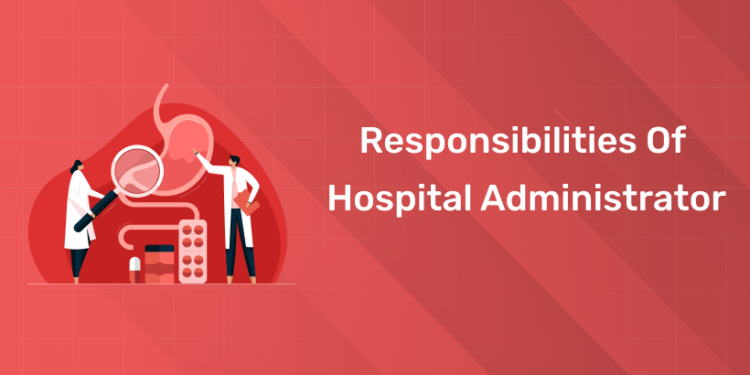Table of Contents
Hospital administrator are the backbone of any hospital. They are the driving force behind the smooth functioning of the hospital and the reputation and success of the hospital. Whether it’s resource management, patient care or department coordination, hospital administrators are the lifeline of the healthcare system.
If you are looking to pursue a career in hospital administration, this article will cover everything you need to know including the job description, responsibilities and duties. Plus we will introduce a top rated Hospital Administration Course in Kerala by Entri to get you started in this field.
Hospital Administrator Job Description
A hospital administrator is a person responsible for the day to day functioning of a hospital or health care facility. Their main objective is to see that all departments work together to deliver the best patient care. This role involves working with medical staff, non medical staff and external stakeholders to maintain high standards of health care.
Skills of a Hospital Administrator:
- Leadership and Communication: To manage multiple teams.
- Problem Solving: To resolve operational issues.
- Decision Making: For budget and resource management.
- Health Care Rules: To maintain legal and ethical standards.
- IT Skills: Knowledge of hospital management software.
Learn hospital administration from Entri Elevate !
Hospital Administrator Responsibilities
1: What is the primary role of a hospital administrator?
Hospital administrators do a lot of things, from managing money to patient satisfaction. Here are the main areas where hospital administrators are involved:
1. Strategic Planning
Hospital administrators develop and execute strategies to improve the hospital overall. This means analyzing what’s happening now, forecasting what will be needed in the future and setting goals.
2. Staff Management
Managing healthcare staff is one of the key responsibilities of a hospital administrator. They make sure each department is staffed properly and employees are trained and supported. They also resolve conflicts and create a positive work environment.
3. Budget and Finance
Hospital administrators manage the hospital’s finances including budgeting, accounting and financial reporting. They try to reduce costs without compromising care.
4. Compliance and Regulation
Compliance with local, state and national healthcare regulations is key. Hospital administrators make sure the facility is compliant with laws, ethical standards and accreditation guidelines.
5. Patient Care Coordination
Administrators work to improve patient care by simplifying processes, reducing wait times and making sure medical staff deliver great care. They also handle patient feedback to improve services.
6. Facilities Management
Managing the hospital’s physical infrastructure including medical equipment and facilities is part of the job. Administrators make sure all resources are up to date and working.
7. Technology
With digital healthcare on the rise, hospital administrators are responsible for integrating and managing technologies like Electronic Health Records (EHR), telemedicine and patient management systems.
8. Crisis Management
Whether it’s a public health emergency or an internal issue, hospital administrators must act fast and smart to contain the crisis.
9. Outreach
Administrators do outreach to promote the hospital, build relationships and run health awareness programs.
Hospital Administration Course with Assured Career Growth
Hospital Administration Course by Entri App: Master essential healthcare management skills, gain certification, and secure top roles in leading hospitals
Join Now!Hospital Administrator Responsibilities
While the responsibilities cover the overall role, the day to day duties of a hospital administrator involve ensuring the hospital runs.
1. Overseeing Daily Tasks
Administering daily tasks like scheduling, resource allocation and inter departmental coordination.
2. Staffing and Training
Recruiting professionals and training programs to keep the workforce up to date with medical and administrative practices.
3. Financial Management
Monitoring expenses, approving budgets and ensuring funds are used for patient care and facility development.
4. Performance Appraisals
Reviewing departments and staff to ensure operational efficiency and identify areas of improvement.
5. External Relations
Working with government, insurance companies and other stakeholders to ensure smooth operations and funding.
6. Safety Standards
Implementing safety protocols to protect patients and staff from harm, infection control and disaster preparedness.
7. Patient Satisfaction
Ensuring patients have a good experience by listening to their concerns and continuous service improvement.
Start your Career in Hospital Administration
Why be a Hospital Administrator?
A career in hospital administration is very fulfilling and has great growth opportunities. As the demand for healthcare services increases, skilled hospital administrators are in high demand globally. It’s not just about managing; it’s about making a real difference in people’s lives by ensuring access to quality healthcare.
If you love both healthcare and management, hospital administration could be the career for you.
| Also Read | |
|---|---|
Enroll with Entri’s Hospital Administration Course
To succeed in this field formal training is essential. Entri’s Hospital Administration Course is for aspiring administrators who want to develop industry ready skills.
Why Entri?
- Complete Curriculum: Covers healthcare management, hospital operations and patient care.
- Experienced Trainers: Learn from industry experts with hands on experience.
- Flexible Learning: Study online and at your own pace.
- Career Guidance: Get assistance on job placements and interview preparation.
If you are in Kerala or looking to start your career in hospital administration, this is the course to gain practical knowledge and certifications.
Hospital Administration Course with Assured Career Growth
Hospital Administration Course by Entri App: Master essential healthcare management skills, gain certification, and secure top roles in leading hospitals
Join Now!Other Roles of Hospital Administrators in Today’s Healthcare
The role of a hospital administrator has grown to include:
Sustainability
Now they focus on making hospitals green by reducing waste and energy.
Marketing
They oversee marketing to bring in more patients and promote services.
Data
Analyzing healthcare trends, patient stats and operational efficiency is part of the job.
Working with Research Teams
Administrators work with research teams to support medical breakthroughs and new treatments.
Conclusion
Being a hospital administrator is a tough job but a rewarding one. From managing day to day operations to driving patient care innovation, hospital administrators are the backbone of a hospital.
If you want to be a hospital administrator, the right education and training is key. Entri’s Hospital Administration Course in Kerala has the perfect mix of theoretical and practical knowledge to get you started on this fulfilling career. Enroll now and start your journey to a brighter future in hospital administration.
Hospital Administration Course with Assured Career Growth
Hospital Administration Course by Entri App: Master essential healthcare management skills, gain certification, and secure top roles in leading hospitals
Join Now!Frequently Asked Questions
What is a hospital administrator?
A hospital administrator is a professional responsible for managing the day-to-day operations of a healthcare facility, including staff management, financial oversight, patient care coordination, and compliance with healthcare regulations.
What qualifications are required to become a hospital administrator?
Most hospital administrators have a bachelor’s or master’s degree in healthcare administration, business management, or a related field. Additional certifications or specialized training, like Entri’s Hospital Administration Course, can also be beneficial.
What skills are essential for hospital administrators?
Key skills include leadership, communication, problem-solving, financial management, knowledge of healthcare regulations, and proficiency in healthcare technologies.
What are the primary responsibilities of a hospital administrator?
Hospital administrators are responsible for staff management, budget planning, regulatory compliance, improving patient care, overseeing daily operations, and managing facilities and resources.
How does a hospital administrator contribute to patient care?
While hospital administrators don’t provide direct patient care, they ensure that the healthcare facility operates efficiently and delivers high-quality services, which directly impacts patient satisfaction and outcomes.
Is there a growing demand for hospital administrators?
Yes, the demand for hospital administrators is rising globally due to the expansion of healthcare services, advancements in technology, and the need for efficient management in hospitals and healthcare facilities.
Can I pursue hospital administration without a medical background?
Absolutely! While a medical background can be advantageous, it is not mandatory. Many successful hospital administrators come from management, finance, or business backgrounds.
What career opportunities are available for hospital administrators?
Career opportunities include roles in hospitals, clinics, nursing homes, healthcare consulting firms, and government health departments. Experienced administrators can also advance to executive-level positions.
What challenges do hospital administrators face?
Common challenges include managing staff shortages, balancing budgets, handling crises like pandemics, maintaining compliance with regulations, and adapting to technological advancements.
How can I start a career in hospital administration?
Begin by obtaining the necessary education and training. Enroll in a specialized program like Entri’s Hospital Administration Course in Kerala, which provides a strong foundation in healthcare management and practical skills to succeed in the field.











